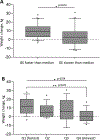Association between gastrointestinal phenotypes and weight gain in younger adults: a prospective 4-year cohort study
- PMID: 32415254
- PMCID: PMC7666652
- DOI: 10.1038/s41366-020-0593-8
Association between gastrointestinal phenotypes and weight gain in younger adults: a prospective 4-year cohort study
Abstract
Background/objectives: Gastrointestinal phenotypes have previously been associated with obesity, however it is unknown if these phenotypes are a cause or a consequence of obesity and weight gain. Our aim was to assess whether these gastrointestinal phenotypes are associated with future weight gain in younger adults.
Subjects/methods: At baseline, 126 adult participants under the age of 35 were weighed and underwent measurement of gastrointestinal phenotypes including gastric emptying (GE), gastric volume, satiation, satiety, and gastrointestinal hormones. Patients were reappraised after median 4.4 years unless, during the period of follow-up, they participated in a formal weight loss program, received obesity-weight loss interventions, or developed a health condition likely to affect weight. Participants were dichotomized into two groups for each phenotype at the median of each phenotype.
Results: In total, 60 participants met criteria for inclusion and were evaluated after a median of 4.4 years [IQR: 3.5-5], 36 participants were excluded due to conditions that would abnormally affect weight during study period including pregnancy and weight loss treatment, and 30 participants were lost to prospective follow-up. Faster GE was significantly associated with weight gain. Those with faster GE at baseline (n = 30) gained a median of 9.6 kg [3.1-14.9] compared with those with slower GE at baseline (n = 30) who gained a median of 2.8 kg [-4.6 to 9.2] (p = 0.03), over the follow-up period. There was no association between the other phenotypes and weight gain.
Conclusions: In adults ≤35 years old, faster gastric emptying is associated with significantly increased weight gain over the medium term. This provides supportive evidence for the role of gastric emptying in weight gain and development of obesity.
Figures
Similar articles
-
Quantitative gastrointestinal and psychological traits associated with obesity and response to weight-loss therapy.Gastroenterology. 2015 Mar;148(3):537-546.e4. doi: 10.1053/j.gastro.2014.11.020. Epub 2014 Dec 6. Gastroenterology. 2015. PMID: 25486131 Free PMC article. Clinical Trial.
-
Effects of liraglutide on weight, satiation, and gastric functions in obesity: a randomised, placebo-controlled pilot trial.Lancet Gastroenterol Hepatol. 2017 Dec;2(12):890-899. doi: 10.1016/S2468-1253(17)30285-6. Epub 2017 Sep 27. Lancet Gastroenterol Hepatol. 2017. PMID: 28958851 Clinical Trial.
-
Gastric sensorimotor functions and hormone profile in normal weight, overweight, and obese people.Gastroenterology. 2006 Dec;131(6):1717-24. doi: 10.1053/j.gastro.2006.10.025. Epub 2006 Oct 15. Gastroenterology. 2006. PMID: 17087952
-
Gastrointestinal hormones and regulation of gastric emptying.Curr Opin Endocrinol Diabetes Obes. 2019 Feb;26(1):3-10. doi: 10.1097/MED.0000000000000448. Curr Opin Endocrinol Diabetes Obes. 2019. PMID: 30418188 Free PMC article. Review.
-
The clinical effectiveness and cost-effectiveness of bariatric (weight loss) surgery for obesity: a systematic review and economic evaluation.Health Technol Assess. 2009 Sep;13(41):1-190, 215-357, iii-iv. doi: 10.3310/hta13410. Health Technol Assess. 2009. PMID: 19726018 Review.
Cited by
-
Selection of Antiobesity Medications Based on Phenotypes Enhances Weight Loss: A Pragmatic Trial in an Obesity Clinic.Obesity (Silver Spring). 2021 Apr;29(4):662-671. doi: 10.1002/oby.23120. Obesity (Silver Spring). 2021. PMID: 33759389 Free PMC article.
-
Gastric Sensory and Motor Functions and Energy Intake in Health and Obesity-Therapeutic Implications.Nutrients. 2021 Apr 1;13(4):1158. doi: 10.3390/nu13041158. Nutrients. 2021. PMID: 33915747 Free PMC article. Review.
-
Effect of endoscopic sleeve gastroplasty on gastric emptying, motility and hormones: a comparative prospective study.Gut. 2023 Jun;72(6):1073-1080. doi: 10.1136/gutjnl-2022-327816. Epub 2022 Oct 14. Gut. 2023. PMID: 36241388 Free PMC article. Clinical Trial.
-
Precision Medicine and Obesity.Handb Exp Pharmacol. 2022;274:467-485. doi: 10.1007/164_2021_566. Handb Exp Pharmacol. 2022. PMID: 34910252 Free PMC article. Review.
-
Associations of gastric volumes, ingestive behavior, calorie and volume intake, and fullness in obesity.Am J Physiol Gastrointest Liver Physiol. 2020 Aug 1;319(2):G238-G244. doi: 10.1152/ajpgi.00140.2020. Epub 2020 Jul 6. Am J Physiol Gastrointest Liver Physiol. 2020. PMID: 32628074 Free PMC article.
References
-
- Acosta A, Streett S, Kroh MD, Cheskin LJ, Saunders KH, Kurian M, et al. White Paper AGA: POWER - Practice Guide on Obesity and Weight Management, Education, and Resources. Clin Gastroenterol Hepatol 2017; 15(5): 631–649 e10. - PubMed
-
- Ng M, Fleming T, Robinson M, Thomson B, Graetz N, Margono C, et al. Global, regional, and national prevalence of overweight and obesity in children and adults during 1980–2013: a systematic analysis for the Global Burden of Disease Study 2013. Lancet (London, England) 2014; 384(9945): 766–781. - PMC - PubMed
-
- Heymsfield SB, Wadden TA. Mechanisms, pathophysiology, and management of obesity. N Engl J Med 2017; 376(3): 254–266. - PubMed
Publication types
MeSH terms
Substances
Grants and funding
LinkOut - more resources
Full Text Sources
Miscellaneous



